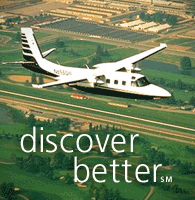Aero Air has a long and proud history associated with Twin Commanders, but they certainly can’t be accused of coasting along on past accomplishments. The Hillsboro, Oregon-based authorized service center redefines its history every day.
Aero Air traces its roots to 1956 and Hillsboro Aviation, one of the first distributors and service centers for the recently introduced Aero Commander piston twin. Hillsboro Aviation also was a Piper distributor, and in 1966 the company was told it couldn’t represent both brands. Co-owner Swede Ralston flew to Oklahoma City and, carrying a check for a new airplane, convinced Aero Commander executives to award him and his new company, Aero Air, the Commander distributorship.
Over the years Hillsboro Aviation, and then Aero Air, sold more than 200 new Commanders. That ended when Commander production ceased in the mid-1980s. Aero Air then transitioned to selling, servicing, and upgrading existing Commanders.
Today Aero Air is a full-service Twin Commander and Honeywell line/major service center with 200 employees and the technicians, experience, tools, parts, and facilities to handle inspections, modifications, upgrades, and repairs. Capabilities include:
- 150-hour inspections
- Wing spar inspections and NDT
- Landing gear overhauls
- Soundproofing packages
- Major service bulletin compliance
- Dash-10T engine conversions
- Life-limit items
- Structural repairs including engineering and DER certification
- Hot-bond and composite repairs
- Major avionics repair, service, and installations
- Worldwide parts sales
- Interior refurbishment including recovering of seats, carpet, and all
- Soft goods
- Cabinetry refinishing and modification
Led by veteran Twin Commander technician Ken Molczan, Aero Air has developed several STCs for Twin Commander modifications including Hartzell Q-Tip Wide-Chord propellers for Dash 10 engines, a main cabin door mod that allows the door to swing open 180 degrees, and moving 690/A/B auxiliary fuel pumps from the fuselage tank to main gear wheel wells for easy accessibility and service.
More recently Aero Air has expanded its scope to include medevac and fire-fighting. “We are unusual in the sense that we both an operator as well as a service center,” commented Aero Air President Kevin McCullough. “We do both sides, and can relate to both sides.”
Aero Air owns and operates five 690-series Turbo Commanders in medevac service, and manages and operates three more for owners. The company also has been awarded a key U.S. Forest Service contract to conduct firefighting operations in the Northwest using three DC10s DC7s and seven MD87s that it is converting to firebombers with Aero Air-developed STCs.
The company operates a total of 31 different turboprops and jets, and employs about 85 pilots, for medevac, firefighting, and corporate and personal transportation. “We’re flying every day,” McCullough said. “We fly a lot of hours.” Nearly 20 pilots are dedicated to the Twin Commander fleet. All Aero Air pilots are trained and checked in house.
 The medevac Commanders are flown single-pilot, which frees up an extra seat and more useful load for patients, medical personnel, and family members. All of Aero Air’s Commanders have contemporary panels with Garmin G600 displays and, in some cases GNS750 and 650 flight management systems. “The hospitals we work with all appreciate that, with the Garmin installations, the Commanders truly are single-plot airplanes,” McCullough said.
The medevac Commanders are flown single-pilot, which frees up an extra seat and more useful load for patients, medical personnel, and family members. All of Aero Air’s Commanders have contemporary panels with Garmin G600 displays and, in some cases GNS750 and 650 flight management systems. “The hospitals we work with all appreciate that, with the Garmin installations, the Commanders truly are single-plot airplanes,” McCullough said.
Along with flying patients from throughout the Northwest to major urban hospitals for specialized care, Aero Air flies surgical teams to obtain donor organs for transplants.
Even as Aero Air expands its medevac operations with jets, and adds new capabilities such as aerial firefighting using transport-category aircraft, McCullough sees continued reliance on Twin Commanders. That goes for servicing customer Commanders and operating its own.
“I will always see Commanders in our future,” McCullough said. “With the support of the factory, and all of the upgrade programs available, it’s going to be a viable airplane for a long time to come.”




